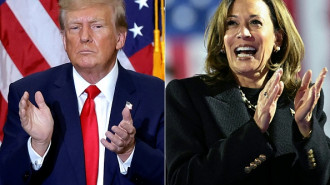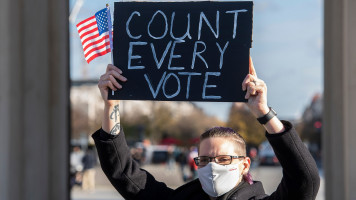WATCH: Uighur Muslims using TikTok to expose plight of relatives detained by China
Families of detained Uighur Muslims are using viral video app TikTok to raise awareness about the estimated one million Uighurs who are thought to be detained in Chinese concentration camps, The Guardian reported.
In the videos shared on social media, relatives appear superimposed over photographs of their detained family members. The videos are often accompanied by mournful music.
Many of the relatives are crying in the videos.
The new TikTok trend marks the latest attempt by Uighur Muslims to raise awareness about the detention of an estimated one million people in China's northwestern Xinjiang province.
When Chinese officials last month claimed that 90 percent of the detainees had been released, Uighurs used the Twitter hashtag #ProveThe90 to share the stories of their still-missing relatives.
"I still haven't heard from my family disappeared in China. I am counting the days, hours and minutes. #Whereismyfamily? #ProveThe90. I am planning to take more legal actions on their forced disappearance," one Twitter used said.
Other social media users have previously called for China to show their relatives are free under the hashtag #MeTooUyghur.
Now, viral video app TikTok - which enables users to post 15 to 60 second long videos, often paired with music - is enabling Uighurs to come together en masse and raise awareness of their plight.
Read more: Uighur Muslims abroad are refugees fleeing China's oppression. Don't send them back under any circumstances
The app groups together videos using the same music clip in the background. Most of the recent posts showing pictures of detained relatives use the same eery refrain.
It is unclear whether the videos were made by Uighurs in China or in the diaspora.
If the videos were shot and published from within Xinjiang, it may indicate a significant easing of security restrictions. The northwestern region has become a testing ground for high-tech surveillance measures amid China's crackdown on its Muslim population.
"That may have given more Uighurs the confidence to go public with their situation," David Brophy, a senior lecturer in modern Chinese history at the University of Sydney, told The Guardian.
"They're obviously desperate, and taking a big risk in doing this, but this could signal a turning point in the willingness of people inside Xinjiang to defy the party-state and express opposition to what’s going on."
China claims that its Xinjiang detention centres are not concentration camps but "re-education camps" where "students" can "train" to successfully reintegrate into Chinese society. It claims the camps are a necessary measure to counter Islamic extremism.
However, human rights groups say that Uighurs and other Muslim minorities endure political indoctrination at the internment camps.
Follow us on Twitter: @The_NewArab





 Follow the Middle East's top stories in English at The New Arab on Google News
Follow the Middle East's top stories in English at The New Arab on Google News


